| Fourth Quarter 2012 | story by ANNE BROCKHOFF | photos by STEPHEN HERTZOG |
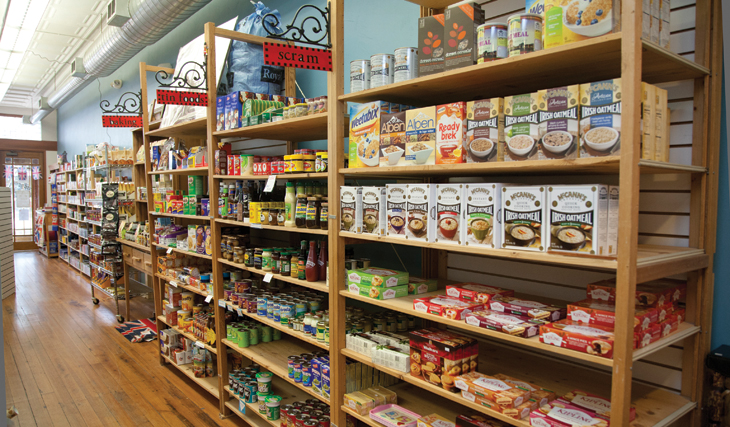
Food is a powerful thing, especially when you’re living in a foreign country. Just ask Lora Wiley, co-owner of Au Marché, which specializes in European food.
Wiley spent a year studying in France during college and was starting to feel homesick when she visited a friend in Aix-en-Provence. While there, Wiley wandered into a shop selling American food. She never forgot the feeling.
“I was surprised by how emotional I was at seeing things like Skittles, Budweiser and Oreos,” Wiley says. “I didn’t even eat much of those things back home, but it really pulled at my heartstrings.”
She’s not alone. Every day, a growing number of consumers seek the flavors of home or tastes from their travels at Au Marché, Brits, the Mediterranean Market & Café and supermarkets such as Checkers Foods. Nationwide, retail sales of specialty foods rose 9.2 percent to $59.7 billion in 2011, according to the National Association for the Specialty Food Trade.
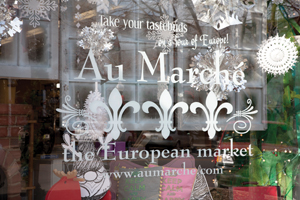 “The U.S. has gotten so much more interested in food and food culture,” says Louise Kramer, a spokeswoman for the trade group. “Especially in the past few years, there’s been an amazing passion for the world of food.”
“The U.S. has gotten so much more interested in food and food culture,” says Louise Kramer, a spokeswoman for the trade group. “Especially in the past few years, there’s been an amazing passion for the world of food.”
No one knows that better than Sally Helm, who opened Brits with her then-business partner Susie Pryor in 1995. Food accounts for about 60 percent of Brits’ sales, while bath and body products, Dr. Who merchandise, giftware, DVD and VHS rentals and memorabilia from Prince William’s wedding and other events generate the rest.
Helm buys HobNobs (a cookie-like snack), Fairy liquid dishwashing soap, HP Sauce and Cadbury Flake chocolate bars and other staples from several U.S.-based specialty distributors. Still, keeping track of which company has what brands in stock at any given time is tricky, especially since expected shipments are sometimes delayed in customs.
Importing gift items directly was problematic until recently. Now, Helm occasionally uses an online payment system called Xoom.com and co-loads containers with other companies. She won’t import food herself because the process is too complicated and unpredictable, especially when it comes to meat and cheese products.
Instead, Helm stocks her freezer case with sausages and savory meat pies made by Cameron’s Market, the English Pork Pie Company and other American companies with British roots. Still, distribution remains Helm’s biggest challenge.
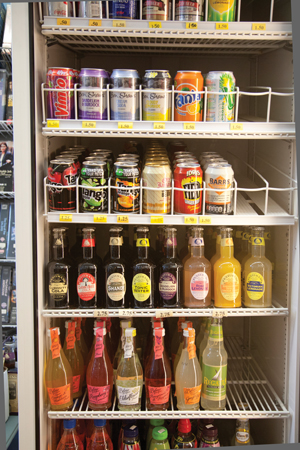 “It’s what our little industry is lacking,” says Helm, who also sells goods through the Brits web site. “There’s no real distribution network.”
“It’s what our little industry is lacking,” says Helm, who also sells goods through the Brits web site. “There’s no real distribution network.”
Brits moved to its current location at 929 Massachusetts Street in 2003, just as Wiley’s Au Marché was moving in next door. The two share more than a wall, though—theirs is also a shared history.
Wiley befriended Helm and Pryor after visiting their store in 1996, and the women asked her to become their partner in opening Au Marché two years later. Wiley bought Pryor’s share of the business in 2006; Helm retains her one-third stake in Au Marché and is now the sole owner of Brits. The two companies collaborate on events including a holiday open house in November, but otherwise operate separately.
Au Marché sells food, bath and beauty products and gifts from France, Germany, The Netherlands, Sweden and other continental European countries both in the store and online. There’s Cavallini wrapping paper and Swedish Dream Sea Salt Soap, Lurpak butter, Anna’s Ginger Thins, Benedetto Cavalieri pastas and Edmond Fallot Dijon mustard. And there’s chocolate. Lots and lots of chocolate.
Besides dozens of European brands, Au Marche has a display case full of Christopher Elbow chocolates, which are made in Kansas City. Shoppers these days are spending less per ticket, but sweet treats remain an affordable luxury, Wiley says.
“The economy went south in 2008 and 2009, but we’re selling more candy than ever,” Wiley says.
The Mediterranean Market & Café has also weathered the economic downturn, mostly by keeping prices low, introducing new products and working more hours, says owner Mohammad Al-zaiti. But then, those are things he’s always done since opening in 1998.
Al-zaiti was an electrical engineering student at the University of Kansas back then. He couldn’t find the foods he missed from his native Jordan, so he opened a store to sell them. At first, Al-zaiti focused on products from Jordan, Syria and Lebanon, but customers soon asked for more.
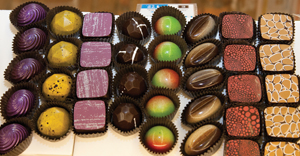 By the time he moved to a larger location at Bob Billings Parkway and Kasold Dr. in 2000, the market was selling items from throughout the Middle East and Eastern Europe, as well as India, Pakistan, Iran, Greece and Italy.
By the time he moved to a larger location at Bob Billings Parkway and Kasold Dr. in 2000, the market was selling items from throughout the Middle East and Eastern Europe, as well as India, Pakistan, Iran, Greece and Italy.
You can now find everything from buckwheat kasha and freekeh (roasted green wheat) to olive oil and olives; spices; chili, tomato and eggplant pastes; canned broad, fava and ful beans; non-alcoholic malted fruit drinks; frozen cassava and jute leaves; rice and flours; pickles and chutneys; teas and coffees; and halal chicken, lamb and goat.
While many shoppers are expatriates, restaurant owners or frequent travelers who know exactly what they want, about 70 percent of customers are Americans attracted by the Mediterranean diet’s health benefits or intrigued by Middle Eastern cuisine. Al-zaiti opened the café to connect with them all.
Customers can order gyros, falafel, shawarma, moussaka and other specialties to eat in the café or take out and buy pastries, hummus (which Al-zaiti also sells at the Community Mercantile) and other products at the deli counter.
“That way they can try the food first, and it encourages them to go buy the products and make it at home,” Al-zaiti says.
As for those prices, Al-zaiti buys in bulk, negotiates directly with manufacturers and seeks out specialty coffee roasters and other suppliers in cities with large ethnic populations to get the best deals. But even more appealing, he says, is the sense of community that’s evolved in the store.
 “A neat thing happens here,” says Al-zaiti. “The customers themselves, whether they live here or are from the Middle East or Europe, they interact with each other, explaining the products and getting involved. I like seeing customers helping other customers.”
“A neat thing happens here,” says Al-zaiti. “The customers themselves, whether they live here or are from the Middle East or Europe, they interact with each other, explaining the products and getting involved. I like seeing customers helping other customers.”
That customers want more international food has also captured the attention of Lawrence supermarkets. Most now carry ingredients from Asian, Latin American and other countries, but none have committed to the market quite like Checkers Foods at 23rd and Louisiana streets.
Walk through the produce section, and you’ll find longan (a small Southeast Asian fruit), both smooth and spiny chayote squash, five types of fresh chiles, four kinds of eggplant, gai choy (also called Chinese mustard), taro and yucca roots and opo and tatuma squash.
Some items, such as garlic grass, are locally grown. Others, including canned peppers, salsas and beans, Mexican sodas and juices and frozen banana leaf and tamarind pulp are sourced from distributors. They’re all there because customers asked for them.
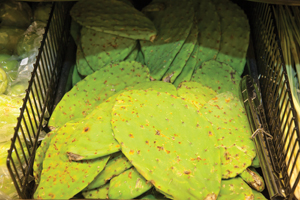 “Being independent, we’re able to take requests, and we don’t have to get permission from corporate headquarters to carry certain things,” says Dan Callan, who manages the store’s specialty foods department.
“Being independent, we’re able to take requests, and we don’t have to get permission from corporate headquarters to carry certain things,” says Dan Callan, who manages the store’s specialty foods department.
The push into specialty foods began about five years ago, Callan says, and the store’s inventory has grown through trial and error. If something sells—like the dried shiitake and black fungus mushrooms often used in Asian cooking—it stays. If it doesn’t, they drop it.
“This is a pretty competitive town for grocers,” Callan says. “This is something we can do to broaden our customer base and increase sales.”
